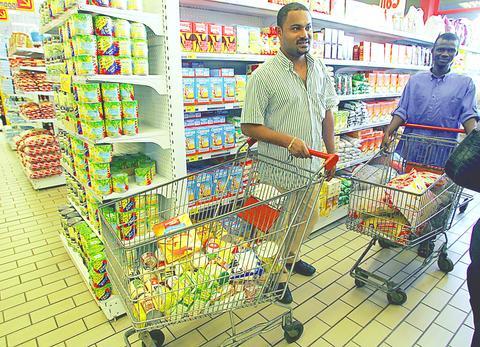Staring with tears in their eyes, Ivory Coast's people emerged from their homes to survey the wreckage of five days of violent upheaval -- and stock up with food against any feared next round.
France and some other Western nations flew out hundreds of their nationals Thursday in a second day of evacuations as South Africa convened urgent talks in a crisis it warns could destabilize West Africa.

PHOTO: AFP
The commercial capital, Abidjan, experienced the first day of calm since anti-foreigner mobs took to the streets last Saturday after a sudden, deadly clash between Ivory Coast forces and its former colonial ruler, France.
Some shops reopened and traffic returned to streets strewn with charred vehicles and the remnants of roadblocks. Residents crowded supermarkets and waited in long lines to draw cash from ATMs.
A woman stood horrified amid the burned-out wreckage of a French bookstore with tears welling in her eyes. Employees at an Ivorian frozen-foods company found the doors kicked in and the freezers emptied.
"They took everything, even the carpet," a delivery man said, too afraid to give his name. "Our entire future is in question. A boss can't pay people who can't work any more."
Once one of West Africa's most prosperous and stable countries, Ivory Coast has been riven by instability since a 1999 military coup ignited ethnic and regional tensions between the predominantly Muslim north and mostly Christian and animist south.
France, with some 14,000 citizens here, sent helicopters on Wednesday to pluck foreigners from villages and bring them to Abidjan's international airport, still crowded on Thursday with frightened families waiting for flights out.
A 15-year resident cradling her baby in the departure hall said she had just minutes to decide whether to stay or go when French soldiers swooped into Jacqueville, about 40km west of Abidjan.
"I grabbed my baby and I grab-bed by photo album and I jumped in the helicopter," said the French woman, who gave her name only as Caroline.
The violence began when Ivory Coast warplanes killed nine French peacekeepers and an American aid worker in an airstrike last Saturday on the north during three days of government bombardments that violated a 2003 ceasefire in a now two-year-old civil war.
Within hours, France had wiped out the nation's newly built-up air force, sparking an uprising by loyalist youths who took to the streets with machetes, iron bars and clubs.
The mayhem, driven by President Laurent Gbagbo's fiercely patriotic supporters and checked only intermittently by his government, has been condemned by fellow African leaders and drawn moves toward UN sanctions.
UN Secretary-General Kofi Annan reiterated his call to all parties to end the violence and condemned "the use of hate media which is fueling the tensions, xenophobia and inciting violent acts," UN spokesman Fred Eckhard said Thursday at UN headquarters in New York.
"He reminds all concerned that they may be held accountable for their acts, in conformity with international criminal, human rights and humanitarian law," Eckhard said.
South African President Thabo Mbeki opened talks Thursday in Pretoria with the country's political representatives, including opposition leader and former Prime Minister Alassane Ouattara.

A fire caused by a burst gas pipe yesterday spread to several homes and sent a fireball soaring into the sky outside Malaysia’s largest city, injuring more than 100 people. The towering inferno near a gas station in Putra Heights outside Kuala Lumpur was visible for kilometers and lasted for several hours. It happened during a public holiday as Muslims, who are the majority in Malaysia, celebrate the second day of Eid al-Fitr. National oil company Petronas said the fire started at one of its gas pipelines at 8:10am and the affected pipeline was later isolated. Disaster management officials said shutting the

US Vice President J.D. Vance on Friday accused Denmark of not having done enough to protect Greenland, when he visited the strategically placed and resource-rich Danish territory coveted by US President Donald Trump. Vance made his comment during a trip to the Pituffik Space Base in northwestern Greenland, a visit viewed by Copenhagen and Nuuk as a provocation. “Our message to Denmark is very simple: You have not done a good job by the people of Greenland,” Vance told a news conference. “You have under-invested in the people of Greenland, and you have under-invested in the security architecture of this

Japan unveiled a plan on Thursday to evacuate around 120,000 residents and tourists from its southern islets near Taiwan within six days in the event of an “emergency”. The plan was put together as “the security situation surrounding our nation grows severe” and with an “emergency” in mind, the government’s crisis management office said. Exactly what that emergency might be was left unspecified in the plan but it envisages the evacuation of around 120,000 people in five Japanese islets close to Taiwan. China claims Taiwan as part of its territory and has stepped up military pressure in recent years, including

UNREST: The authorities in Turkey arrested 13 Turkish journalists in five days, deported a BBC correspondent and on Thursday arrested a reporter from Sweden Waving flags and chanting slogans, many hundreds of thousands of anti-government demonstrators on Saturday rallied in Istanbul, Turkey, in defence of democracy after the arrest of Istanbul Mayor Ekrem Imamoglu which sparked Turkey’s worst street unrest in more than a decade. Under a cloudless blue sky, vast crowds gathered in Maltepe on the Asian side of Turkey’s biggest city on the eve of the Eid al-Fitr celebration which started yesterday, marking the end of Ramadan. Ozgur Ozel, chairman of the main opposition Republican People’s Party (CHP), which organized the rally, said there were 2.2 million people in the crowd, but